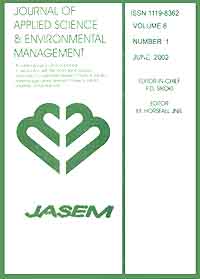
|
Journal of Applied Sciences and Environmental Management
World Bank assisted National Agricultural Research Project (NARP) - University of Port Harcourt
ISSN: 1119-8362
Vol. 15, No. 3, 2011, pp. 467-472
|
 Bioline Code: ja11078
Bioline Code: ja11078
Full paper language: English
Document type: Research Article
Document available free of charge
|
|
|
Journal of Applied Sciences and Environmental Management, Vol. 15, No. 3, 2011, pp. 467-472
| en |
Adsorption of Acetic Acid, Cadmium ions, Lead ions and Iodine Using Activated Carbon from Waste Wood and Rice Husks
Goodhead, T.O. & Dagde, K.K.
Abstract
This paper presents the performance evaluation of locally prepared activated carbon from rice husk
and saw dust. The raw materials were carbonized at different temperatures (600-800°C) using sodium hydroxide
(NaOH) as the activating agent. The study includes moisture content determination of the raw materials used in the
activation and carbonization processes. The effects of variations in carbonization temperature and concentration of
activating agent on various performance indices for good quality absorbent were investigated. The percentage yield
of the activated carbon from the raw materials as well as iodine number and adsorption of heavy metals from aqueous
solutions were also determined. The experimental data which make a comparative assessment of activated carbon
obtained from rice husk and saw dust were also presented. Preliminary examination of the raw materials showed that
rice husk and saw dust had a moisture content of 14.6% and 5.8% respectively. Increase in carbonization temperature
decreases yield of the active carbon. The highest yield of about 48% was obtained from rice husk at 600°C, with
moisture content of 26%. The rice husk at 800°C gave a yield of 47.2% with moisture content of 26.5%. While the
yields of the saw dust were 44% at 600°C and 40% at 800°C with moisture content of 17% and 19% respectively. A
detailed study of mass transfer processes indicated that activated carbon from these materials show good
performance.
|
| |
© Copyright 2011 - Journal of Applied Sciences and Environmental Management
|
|
